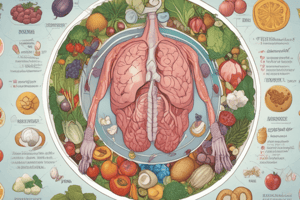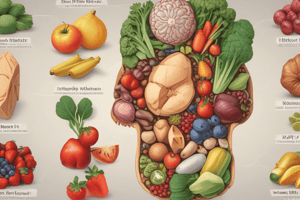Podcast
Questions and Answers
What is the primary function of carbohydrates in the body?
What is the primary function of carbohydrates in the body?
What type of protein is essential for the body and cannot be produced?
What type of protein is essential for the body and cannot be produced?
Which type of fat is typically found in animal products and is associated with increased health risks?
Which type of fat is typically found in animal products and is associated with increased health risks?
What is the primary function of vitamins in the body?
What is the primary function of vitamins in the body?
Signup and view all the answers
Which mineral is crucial for nerve function and bone health?
Which mineral is crucial for nerve function and bone health?
Signup and view all the answers
What is the purpose of the Dietary Reference Intake (DRI)?
What is the purpose of the Dietary Reference Intake (DRI)?
Signup and view all the answers
What is the primary characteristic of healthy eating patterns?
What is the primary characteristic of healthy eating patterns?
Signup and view all the answers
What is the result of inadequate or excessive nutrient intake?
What is the result of inadequate or excessive nutrient intake?
Signup and view all the answers
What is the term for diseases caused by inadequate intake of specific nutrients?
What is the term for diseases caused by inadequate intake of specific nutrients?
Signup and view all the answers
What is the term for diseases linked to poor nutrition and lifestyle choices?
What is the term for diseases linked to poor nutrition and lifestyle choices?
Signup and view all the answers
Study Notes
Macronutrients
- Carbohydrates:
- Provide energy for the body
- Found in grains, fruits, vegetables, and dairy products
- Types: simple (sugars), complex (starches, fibers)
- Protein:
- Build and repair body tissues
- Found in animal products, legumes, nuts, and seeds
- Essential amino acids: cannot be produced by the body, must be consumed
- Fat:
- Provide energy, absorb vitamins, and maintain healthy skin and hair
- Found in animal products, nuts, seeds, and oils
- Types: saturated, unsaturated, trans
Micronutrients
- Vitamins:
- Essential for energy production, immune function, and growth
- Found in fruits, vegetables, whole grains, and fortified foods
- Types: fat-soluble (A, D, E, K), water-soluble (B, C)
- Minerals:
- Crucial for various bodily functions, such as nerve function and bone health
- Found in fruits, vegetables, whole grains, and fortified foods
- Types: macrominerals (calcium, phosphorus, potassium), microminerals (iron, zinc, iodine)
Nutrition Recommendations
- Dietary Reference Intake (DRI):
- Estimating daily nutrient intake for optimal health
- Includes Recommended Dietary Allowance (RDA), Adequate Intake (AI), and Tolerable Upper Intake Level (UL)
- Healthy Eating Patterns:
- Emphasize whole, minimally processed foods
- Include a variety of fruits, vegetables, whole grains, lean proteins, and healthy fats
- Limit added sugars, saturated fats, and refined carbohydrates
Nutrition-Related Health Issues
- Malnutrition:
- Inadequate or excessive nutrient intake
- Can lead to impaired growth, weakened immune system, and increased disease risk
- Deficiency Diseases:
- Caused by inadequate intake of specific nutrients (e.g., scurvy from vitamin C deficiency, anemia from iron deficiency)
- Chronic Diseases:
- Linked to poor nutrition and lifestyle choices (e.g., obesity, diabetes, cardiovascular disease)
Macronutrients
- Carbohydrates provide energy for the body and are found in grains, fruits, vegetables, and dairy products, with types including simple (sugars) and complex (starches, fibers).
- Protein builds and repairs body tissues, is found in animal products, legumes, nuts, and seeds, and includes essential amino acids that cannot be produced by the body.
- Fat provides energy, absorbs vitamins, and maintains healthy skin and hair, is found in animal products, nuts, seeds, and oils, and has types including saturated, unsaturated, and trans.
Micronutrients
- Vitamins are essential for energy production, immune function, and growth, are found in fruits, vegetables, whole grains, and fortified foods, and have types including fat-soluble (A, D, E, K) and water-soluble (B, C).
- Minerals are crucial for various bodily functions such as nerve function and bone health, are found in fruits, vegetables, whole grains, and fortified foods, and have types including macrominerals (calcium, phosphorus, potassium) and microminerals (iron, zinc, iodine).
Nutrition Recommendations
- The Dietary Reference Intake (DRI) is used to estimate daily nutrient intake for optimal health and includes the Recommended Dietary Allowance (RDA), Adequate Intake (AI), and Tolerable Upper Intake Level (UL).
- Healthy Eating Patterns emphasize whole, minimally processed foods, including a variety of fruits, vegetables, whole grains, lean proteins, and healthy fats, while limiting added sugars, saturated fats, and refined carbohydrates.
Nutrition-Related Health Issues
- Malnutrition occurs when there is inadequate or excessive nutrient intake, leading to impaired growth, weakened immune system, and increased disease risk.
- Deficiency Diseases are caused by inadequate intake of specific nutrients, such as scurvy from vitamin C deficiency or anemia from iron deficiency.
- Chronic Diseases, such as obesity, diabetes, and cardiovascular disease, are linked to poor nutrition and lifestyle choices.
Studying That Suits You
Use AI to generate personalized quizzes and flashcards to suit your learning preferences.
Description
This quiz covers the functions and sources of macronutrients including carbohydrates, protein, and fat. Learn about the types of each and their importance for the body.




